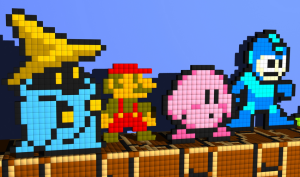Playing brain-training video games may help reverse the natural decline in cognitive abilities among older people, according to scientists who published their research in Nature this week.
As The Guardian reported:
“They found that 60-year-olds who played a custom-designed video game for 12 hours over the course of a month improved their multitasking abilities to levels better than those achieved by 20-year-olds playing the game for the first time. The subjects retained those improvements six months later.”
 The UK SMC rounded up reaction from experts:
The UK SMC rounded up reaction from experts:
Dr Emil Toescu, Neuronal Network Group, School of Clinical and Experimental Medicine, University of Birmingham, comments:
“This work provides important information for those studying and trying to improve the cognitive interventions for the elderly as a means of reducing their age-dependent decrease in function. It also has potential as a preventive measure against neurodegenerative diseases. The technology is not yet sufficiently proven to recommend itself for immediate adoption by older people, but, on the other hand, a moderately complex gaming experience is always good fun, whatever the age, and it cannot do damage. At best, it can improve!
“Because of previous animal and human studies we have known for some time that ‘you can teach an old dog new tricks’ as the aged brain can learn and improve. The main problem is that the improved cognitive performance is specific to the one repeated task. i.e. you can end up with specialist elders who are great at number crunching or word recognition, but don’t have a significant improvement in their daily life cognitive performance. This research is interesting because Anguera and Gazzaley’s group shows that if you multitask during a specific training routine, it improves performance with more than just that single task. The improvement is transferred to other cognitive domains. Even more importantly, and this feature has not been tested frequently enough in previous studies, the improved cognitive performances were maintained 6-months after the multitasking training schedule. However, this was only statistically significant for the tasks of being able to keep words in the working memory for a longer time (delayed recognition test) and for sustained attention. Other parameters tested showed only a suggestive ‘trend’ (always a dangerous double sword!).
“This study provides good evidence and follows from several older observations. One, stemming from work initially performed in animal studies, is that the cognitive deficits that emerge with increased age (it happens in animals as well, and it can be measured and assessed quite precisely!), can be significantly reduced when the animals are maintained or provided with an enriched environment. If one reads ‘multitasking’ for the ‘enriched environment’, a potential for cognitive intervention in the aged emerges.
“There are also some notes of caution. In the study they established a ‘neural basis’ of the training effects by monitoring with EEG on the scalp. Essentially they assessed the changes in a specific band of brain activity frequencies: the theta frequency (4-7Hz). That makes sense in the context of EEG recordings, as it is very clear and easy to detect and quantify. However, it should be mentioned that there is debate about whether activity in this theta frequency actually means greater cognitive functions. Some studies support this theory, others suggest that the theta activity is a precursor of a higher-frequency activity (gamma band: 20-80Hz) and that this region-specific gamma activity is more significant. Several studies show that this gamma activity is significantly affected by the ageing process but it’s much more difficult to examine through scalp recordings of EEG. It will be fascinating to find out if a multi-tasking training protocol could modify activity in this gamma activity.
“Despite the description by the authors of the experimental setup as a “three-dimensional immersive and fun game”, it’s really very basic and definitely no Grand Theft Auto with luxurious and detailed backgrounds. However, if this much can be done with a 1980s interface, it would be fascinating to see what a proper 21st century game environment will do for the elders of today – Vettel, beware, Einsteins are coming!”